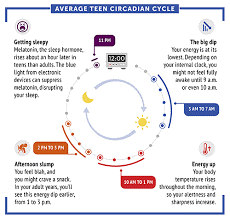It is scientifically proven that high school students require more sleep than the average elementary-aged student. Students ages 14-18 receive fundamental physiological and mental changes when they sleep, making sufficient rest crucial. Teenagers who receive more sleep do better academically. On the other hand, students who do not, experience an academic decline. All things considered, elementary and high school start times should be reversed.
Circadian Rhythm
The circadian rhythm of a teen, physical and mental changes that follow a 24-hour cycle, are proven to not be entirely engaged until around Ten. On the other hand, elementary-aged children do not require as much sleep for a successful education. On average, the circadian rhythm of an elementary-aged student is fully engaged by Six. Knowing this, it is questionable as to why the average American elementary school begins at around 8:30-9:00. On the other hand, the standard high school begins at 7:00-7:30 AM.
Benefits of a Later Start Time
According to the National Sleep Foundation, +70% of high school students do not receive adequate sleep. Early school start times are a major contributing factor to this preposterous number. Consequently, the National Sleep Foundation suggests that Schools should start no earlier than 8:30. Schools that have implemented this rule have seen an increase in academic achievement, attendance, and graduation rates. Lauren Hale, a National Sleep Foundation board member, states, “Simply put, later school start times improve adolescent sleep, health, safety, and learning,” At large, a seemingly trivial change can significantly improve the overall achievement of a school.
Student and Staff Opinions
I asked various current attendees of Lindenhurst High School their opinions on the matter. Numerous expressed strong opinions. 9th-grade English honors teacher Mr. Lynam quotes, “Every time I read about this subject, the research supports a later start time; All of the data people are worried about improves… attendance, graduation rates, grades… it all improves… seems like a no-brainer?” Similarly, Mr. Curtis, the 9th-grade PreAp world teacher states, “I believe that a later start to the school day could provide students with more focus and energy due to greater amounts of sleep, there may also be negative externalities: ill preparation for the early workday in life after school, and potentially less time for after school sports and homework.
I additionally asked my peers their opinions on the matter. Lily Giannattasio voices, “A later start time would benefit students, students will have a greater attention span and put more effort into their work.” Furthermore, “As a student myself, I experience a lack of sleep from the hours put into work and the hours taken away due to our early school starting time,” says Elisa Lin. Sofia Jendruczyk exclaims, “Overall, I believe that starting school later will have a great effect on our learning system.” Lastly, Delaney Phelan states, “I believe that a later start to the school day would be beneficial because high school students have more mental health issues and things running through their heads. If high-school students begin school later, they will be more refreshed and ready to learn.”
Conclusion
In summary, research suggests that high-school students would greatly benefit from starting school later. A later start time improves sleep quality, better grades, higher graduation rates, and improved attendance. What is your opinion on this matter? Do you think it would be a good idea for schools to switch the start times of high schools and elementary schools?







